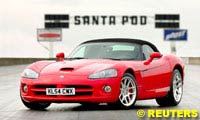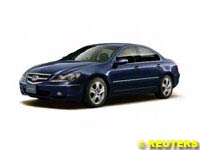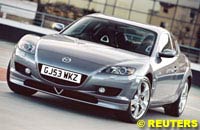

Automotive News and Reviews for the Petrolhead
In this week's issue:
- Car Briefs
- Petrol Prices Near Record Highs
- BMW Chief Sees More Growth in 2005
However, it won't be called Viper: in the UK someone else already has the trademark, so it will be called the Dodge SRT-10. The vital statistics are either silly or awesome, depending on your attitude to these things: 8.3 litre, V10, 500 bhp, 190 mph, 0-62 mph in 3.9 seconds. And the cost? A mere £77,500.
Chrysler promises that the SRT-10 will perform rather better in Europe than the original Viper, the only sports car that could make a TVR look refined. Performance engineering specialist Pro-Drive has re-engineered more than 50 of the SRT-10's components for the European market. All these European components are fitted to vehicles on the production line at the Dodge assembly plant in Detroit.
The new model, now being launched in Japan, is a technological marvel with features you have probably never even thought of, let alone desired. How about this for a specification list? 3.5 V6, 300 bhp, four-wheel drive with variable power splits both front and back and side to side, Night Vision which spots pedestrians, dogs etc. and active noise which emits a frequency to cancel out engine hum.
As with all Japanese technology, it will take time to figure out which features are really useful and which features will quietly fade away (like the 1990s fad for four-wheel steering), but the Legend should make for an interesting experience. Honda may bring over right had drive examples in 2005.
That is a remarkable performance for a sports car, although still some way behind its sibling and the world's best selling sports model - the Mazda MX-5 which has now sold over 700,000 copies. Approximately 25% of RX-8 sales have been in Europe - again an unusually high figure. However, over half the total European sales have been in just one country - the United Kingdom, which is fast becoming the dominant market for sports cars. Even Audi now sells more sports cars (in the shape of the TT) in the UK than in Germany.
VW has dropped plans to make a BMW 5-Series rival.
Its plans were well advanced for the car, codenamed C1, which would have fitted between the Passat and the Phaeton. Given that VW is currently trying to persuade its German workforce to accept job cuts and a pay freeze, another loss-making big saloon (the Phaeton will never recover its investment cost) was not exactly what the doctor ordered.
VW has been heavily criticised for its profligate spending on large cars. Last month, the automotive consultancy, Spyder Automotive, described the C1 as "futile". Separately, VW is also planning to cease production of its W8 4.0 engine recently developed for the Passat. The only mystery is why VW ever thought anyone would want a family saloon powered by a 4.0 petrol engine.
European petrol prices are driving towards record levels to match all-time highs for both crude oil futures and for gasoline traded on the benchmark Rotterdam market, analysts say. Motorists filling up at forecourts in Britain run by oil majors paid an average of 83.3 pence a litre for premium unleaded petrol on Friday, very close to the 85.3p record for UK pump prices in June 2000 that preceded massive nationwide protests.
"Some UK companies have been putting up prices again over the weekend and you'd expect to see more increases," said Jose Blanco, petrol price analyst at oil consultancy Wood Mackenzie/OPAL. Some 30 French farmers blocked a fuel depot of oil major Total in northern France on Monday in protest at soaring fuel costs.
Fuel protests in France back in 2000 quickly spread across the channel, heralding blockades of UK oil terminals by British hauliers and farmers that brought the country to a virtual standstill and rocked Tony Blair's Labour government.
Blanco said UK petrol prices were 0.8 pence a litre up at oil major-branded forecourts last week to reach the 83.3p level, while supermarket prices were 1.1p up at 81.6p. Diesel prices edged up to 84.5p a litre at oil majors' sites, and to 83.3p at supermarkets, raising the prospect of a renewed fuel price campaign by hauliers prominent in the 2000 protests and blockades of oil terminals.
Blanco said fuel prices rose across Europe last week as international gasoline prices on the key Rotterdam barge market soared to a $500 (278 pounds) a tonne record last Thursday. Diesel cargoes reached fresh peaks on Monday as London International Petroleum Exchange gas oil futures, against which diesel is priced, reached a new record of $485.50 a tonne.
IPE Brent crude oil hit $50 a barrel for the first time in its history on Monday, capping a 65 percent jump this year amid rapid growth in world oil demand, led by China, that has eroded spare production capacity held by the OPEC oil cartel.
Largest Rise in Spain
Blanco said the biggest west European fuel price hikes last week were registered in Spain, where petrol was on average 1.8 eurocents (1.2 pence) up at 93 cents a litre while diesel jumped 2.4 cents to 83.3 cents.
In France, oil major-branded retail sites charged 114.1 eurocents a litre for petrol and 98.7 cents for diesel on Friday, respectively one cent and 0.8 cents up on the week. Hypermarkets stayed very competitive, charging 107.7 cents for petrol and 91.2 cents for diesel, according to OPAL's weekly survey.
Average petrol prices in Germany rose one eurocent last week to 117.9 Eurocents a litre, while diesel was two cents higher at 100.9 cents.
Fuel retailers in Italy charged an average of 116.9 eurocents a litre for petrol on Friday , 0.5 cents up on the week, while diesel rose 0.9 cents to 99.9 cents, Blanco said. The price hikes at European forecourts have lagged behind the gains in international crude oil and oil product prices, narrowing retail profit margins.
"In the UK, the gross diesel margin dropped to just 1.83 pence a litre (at the end of last week), and for gasoline it fell to 4.07p," Blanco said.
He said those levels fell far short of the roughly six pence a litre gross margin oil companies reckon they need to remain profitable on fuel sales, increasing the pressure for more pump price hikes.
BMW expects further growth next year, helped by demand for its new 1-Series hatchback, following record sales, revenues and earnings in 2004, its chief executive has told Reuters.
"This company is positioned in such a way that we will continue our successful growth," Helmut Panke said in an interview when asked whether his forecast for a record 2004 could be topped next year. "We want to be - and will continue to be - one of the most profitable and efficient car companies in the industry," he continued.
Panke added that sales of the 1-Series, BMW's new entry into the highly competitive compact segment, are likely to amount to at least 10,000 cars per month starting in October through all of 2005. Already 5,654 units were delivered to customers last month since its launch on September 18.
"Something along the lines of 120,000 to 150,000 is certainly realistic for next year," Panke said, adding however that the company won't roll out any new derivatives of the current 5-door hatchback version in 2005.
Not only are customers buying the model, he continued, they are adding 3,000 to 5,000 euros on top of the base price for expensive options packages.
"It appears to be in fact the same case as with the Mini," BMW's top manager said, referring to the company's cult subcompact where customers are preferring to buy the higher-priced Cooper and Cooper S models. Panke added that the company would make a decision about whether to build a sporty version of an multi-purpose vehicle "before the end of 2005".
Margins to Rise
Panke reaffirmed that the core automotive division should post a pre-tax profit margin of roughly 8 percent in the current year compared to 2003's level of 7.2 percent, while vehicle deliveries and auto profits should climb by around 8-9 percent.
Despite the torrid pace of sales growth thanks to a flurry of hot models like the 1-Series and the X3 compact offroader, investors have been slow to respond due to BMW's traditionally underwhelming earnings guidance and amid fears of currency effects depressing profits next year once its hedges unwind.
While BMW increased profits by 8.9 percent in the first half, it has so far only ventured to say 2004 earnings will improve by at least 2.8 percent to a record 3.3 billion euros. Moreover, the company has only hedged about a third of its currency exposure for the next year, prompting some analysts to fear hundreds of millions in profits could disappear as a result if the euro stays strong in 2005.
"It is always argued that a third is little. I say a third is a lot," Panke said. "One third at very strong dollar rates helps us more in 2005 than 70 percent at recent exchange rates."
He said that a company of BMW's size must be able to find ways to offset a potential decline of a couple of hundred million euros due to currency headwinds in the coming year.
Nevertheless, BMW said it would continuously work to improve its efficiency step by step rather that announce comprehensive cost-cutting programmes like Volkswagen's 4 billion euro "ForMotion" optimisation plan.
"This is not something that one should start with a 'heave-ho' campaign when the water is up to your neck, but rather every year one has to swim a little to remain above it," he said.
Stock Price Unimportant
Only days after a bullish steel industry held its world congress in Istanbul, Panke reaffirmed that prices for the key commodity aren't causing him any sleepless nights despite news that world number one steelmaker Arcelor aims to hike the price in its supply contracts to above 500 euros per tonne.
"How much steel goes into a car? 600-700 kilograms? Then if the price of steel goes up 100 euros per tonne, that makes 60 or 70 euros," he said. "The raw chassis today costs less than the electrical and electronic components in a car. Overall the leverage (steel prices exert on costs) is not as serious as it is portrayed externally," Panke continued.
The CEO added that the underperformance of BMW shares this year "is not so important", since the wealthy Quandt family that dominates BMW's shareholder structure is a long-term investor that isn't under pressure to reap a return on its investment.
So far this year, the stock has declined by 5.7 percent versus a rise of 2.6 percent in the European autos index, "but if you start from September 2001, we have significantly outperformed the other car stocks," Panke added.
![]() Car Briefs
Car Briefs
 For those who think a TVR is a bit wimpy, Chrysler UK has announced that it will import 15 of the new-generation Viper to the UK in 2005.
For those who think a TVR is a bit wimpy, Chrysler UK has announced that it will import 15 of the new-generation Viper to the UK in 2005.
 Don't fall asleep - this fourth generation Legend looks as interesting as the previous three generations were dull.
Don't fall asleep - this fourth generation Legend looks as interesting as the previous three generations were dull.
 Mazda has announced production of the 100,000th RX-8 after 18 months in production.
Mazda has announced production of the 100,000th RX-8 after 18 months in production.
![]() Petrol Prices Near Record Highs
Petrol Prices Near Record Highs
![]() BMW Chief Sees More Growth in 2005
BMW Chief Sees More Growth in 2005
| Contact the Editor |
© 1995-2005 Kaizar.Com, Inc. . This service is provided under the Atlas F1 terms and conditions.
|
Volume 10, Issue 41
Atlas F1 Exclusive
How Pizzonia Recovered his Career
Ann Bradshaw: Point of View
2004 Japanese GP Review
2004 Japanese GP Review
Technical Review: Japan
Dear Ralf
The One-Day Weekend
Stats Center
Qualifying Differentials
SuperStats
Charts Center
Columns
Season Strokes
On the Road
Elsewhere in Racing
The Weekly Grapevine
> Homepage |